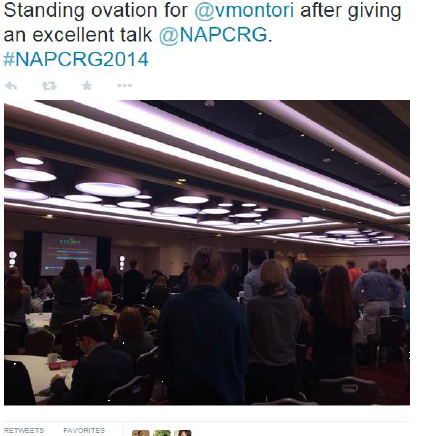|
Back in the summer I was lucky enough to spend some time with James Dunbar and his group at the fantastic Flinders University business centre in Melbourne. We were talking about the Diabetes Collaborative that they are working to support, and using NPT as a framework to think through an unusual problem. How do you deal with implementing events that are rare? We'll have a paper about this ready for publication next year, but in the meantime there's a lot of interest in analysing quality improvement processes using NPT. This is exciting, because QI work is so vital to improving patient experience and outcomes. Trudy van der Weijden's group in the Netherlands has just published a useful and interesting paper that applies NPT to a QI trial. Trudy is one of Europe's leading knowledge translation researchers, and she and I have just participated in a really interesting project - led by Glyn Elwyn, at Dartmouth College in the US - to develop a model for deliberative decision-making in the clinical consultation.  The North American Primary Care Group conference is happening in New York at the moment. The brilliant Victor Montori gave a keynote on Minimally Disruptive Medicine. By all accounts, this was one of the best keynote talks ever given by anyone, and he received a well deserved standing ovation from an international assembly of primary care researchers. If you've ever given a conference plenary, you'll understand what an impossible concept a standing ovation is, and what an extraordinary presentation it must have been. I really wish I had been there! Frances Mair and I have an Editorial in this week's British Medical Journal that sets out some of the key problems around Burden of Treatment and multi-morbidity. That the BMJ should commission this editorial from us shows that the idea of Burden of Treatment is getting traction across the healthcare economy. And why shouldn't it? The bug issue here is patient and carer workload - something that we know much less about than we should. The editorial comes hot on the heels of an important meeting sponsored jointly by the National Institute of Health Research and the Royal College of General Practitioners that sought to develop a strong research agenda on multi-morbidity. The key message that I took away from that meeting was that there was a real risk of turning multi-morbidity into a kind of new disease in itself - in the way that we often now hear chronic illness and long-term conditions spoken about in a quite undifferentiated way. In fact, the big problems here are at a system level, and they're the problems that Frances and I discuss in our editorial. I was a plenary speaker at the RCGP NIHR Multimorbidity meeting and I've embedded my powerpoint presentation below.
I've just advertised an interesting vacancy for a post-doc Research Fellow to work with our NIHR funded programme of work on Complexity, Patient Experience and Organizational Behaviour. The Fellow will mainly work on two projects, the first is developing an implementation analysis in relation to a large clinical trial. We will have a plethora of interview data relating to how people understand and use an everyday health technology, how clinicians make decisions about its use, and about how the marketplace for the technology is organized. We're developing an interesting analytic framework that links micro approaches to the affordances of technologies to macro level analyses of market structuration. The second project is a large scale qualitative meta-synthesis that will look at patient careers through complex illness trajectories towards the end of life. Here the Fellow will support two clinical academic fellows as they develop the review, and work to support the development of a conceptual model of complex illness trajectories that could be the foundation for further research.This is really interesting stuff, and for a recent PhD interested in integrating theoretical development with real data about important problems this combination of projects - both of which ought to produce several publications - could easily be a goldmine. Check out the further particulars on the University of Southampton website and see if the post is the right one for you.
|
BlogArchives
October 2015
Categories |
 RSS Feed
RSS Feed
